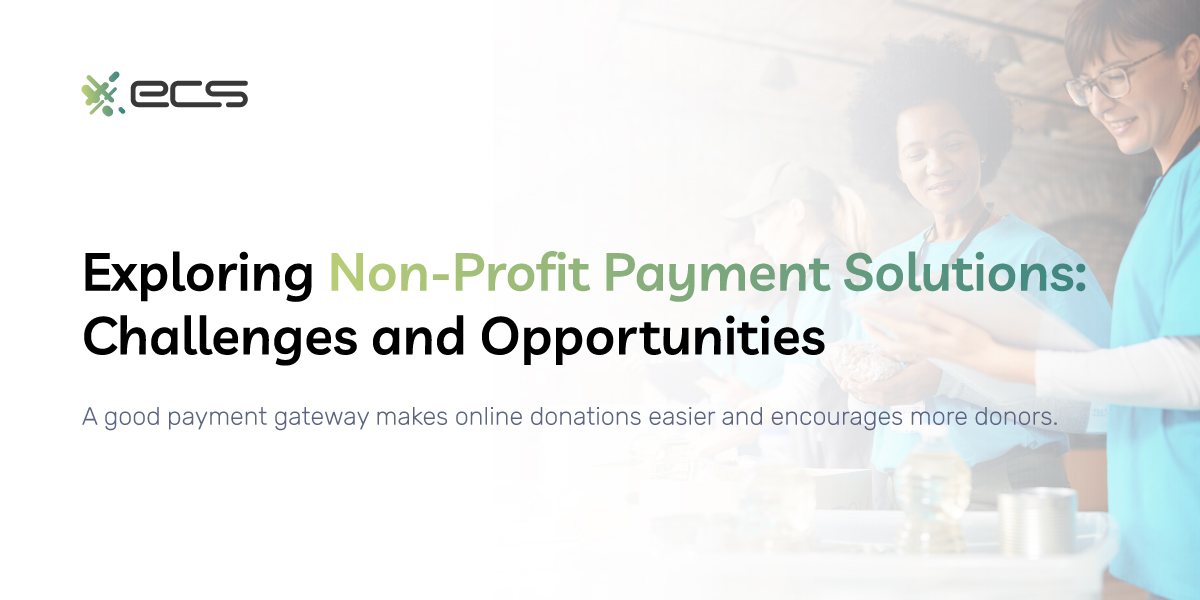Most business solutions and technology are developed to assist for-profit companies. This often leaves those in the non-profit sector with fewer options for specific business tools. Many charities simply end up adjusting their workflows to adapt to for-profit software and tools.
One area where this is common is payment processing and accepting donations. While a few charity-specific platforms exist, there is nowhere near the amount of choice that for-profit companies have. This can leave charities with gaps in their payment processing ability, which can lead to fewer donations or lower average donations due to limited options for donors.
Every charity wants to avoid this, so understanding payment processing and how it relates to a charity is critical to ensuring you maximize donations from your existing donors.
To help you create a robust payment processing workflow that attracts donors, we’ll cover the basics of payment processing and how a charity can take advantage of current technology to maximize donations. Additionally, understanding the impact of payment technology on non-profit fundraising is crucial for developing strategies that enhance donor engagement and increase overall contributions.
Payment Processing Terms For Charities
Before we discuss the more advanced aspects of payment solutions for non-profit, it’s important to understand the basic terms and definitions used in the payment industry. These are the same for both non-profit and for-profit organizations.
Merchant Account
A merchant account is an account you apply for that grants you access to the payment processing networks. Essentially, your merchant account is what you use to process all of your digital payments like credit cards, debit cards, ACH or eChecks, and more.
A merchant account will give your charity access to a payment gateway (which we’ll cover later). A payment gateway is how you send and receive your transaction authorizations. You cannot process digital payments efficiently without access to a payment gateway via a merchant account.
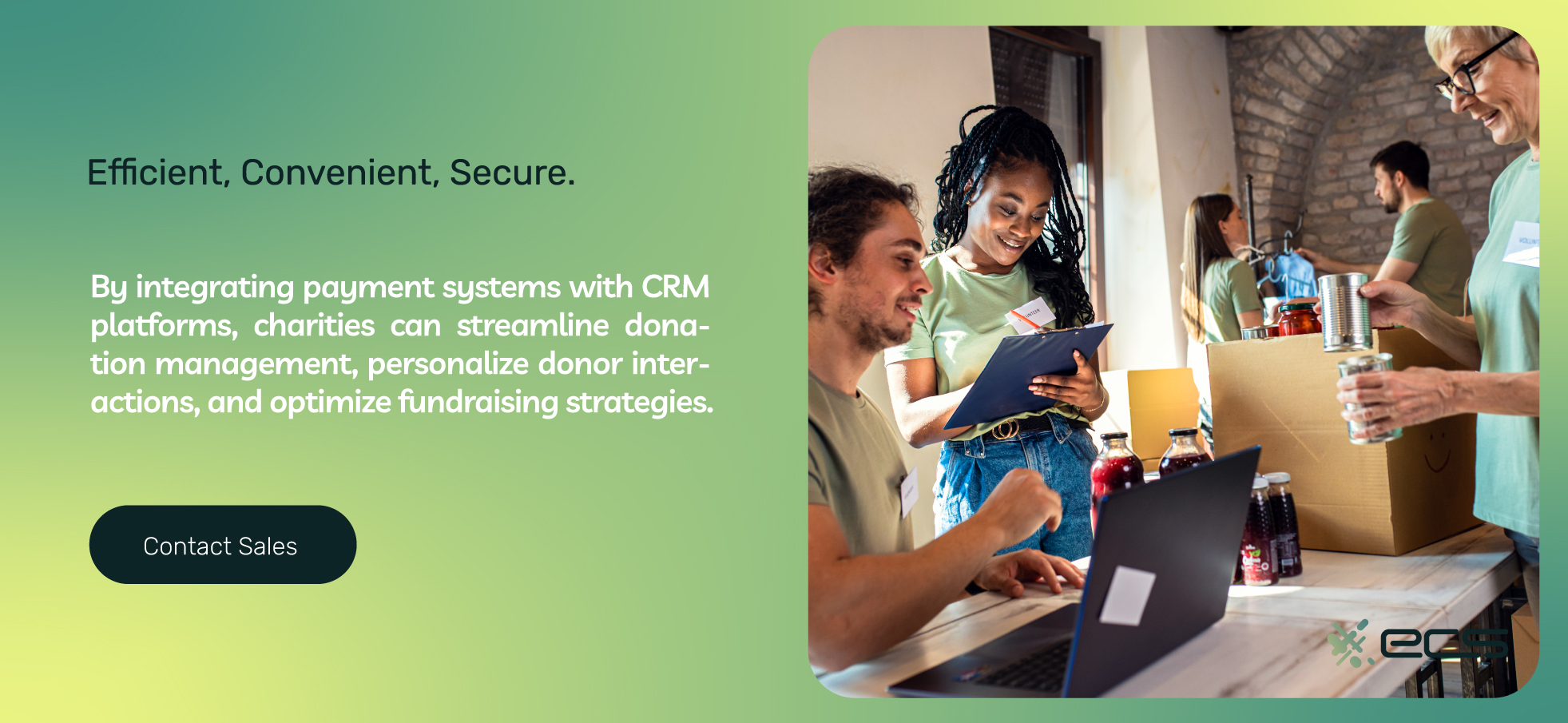
Payment Processor (Acquiring Bank)
A payment processor, or acquiring bank, is the financial institution to which you apply for a merchant account. It is your point of contact for most of your payment processing needs.
They also act as your customer support should you have any technical issues or questions. For this reason, choosing the right payment processor is especially important for a charity organization.
Your payment processor also significantly influences the fees and processing costs you will pay when accepting digital payments. This is important since paying higher fees than you need means less revenue for your charity work.
Different payment processors also provide different services that greatly impact how you can accept payments and integrate them into your existing software, website, or in-person fundraising methods.
Overall, choosing the right payment process is the most important decision when working with digital payments, and we’ll cover exactly how to do this later in the article.
Payment Gateway
A payment gateway connects your charity to the wider global payment network and the different financial institutions involved. When you accept a credit card, you will send the information along with the transaction via the payment gateway for processing.
The payment gateway will return the authorization result and ultimately move the funds from the cardholder’s bank account to your merchant account. You can then move the funds to your business bank account.
This may sound a bit technical, but most of the process happens behind the scenes. However, different payment gateways are compatible with different types of websites, software, and processing needs.
So, having the best payment gateway for non-profits can save you time and hassle when it comes to compatibility with your existing systems and fundraising workflows. This is another important reason to work with the right payment processor.
Your payment processor can help you choose the right payment gateway and integrate it with your existing systems. This will result in easier donation acceptance and simplified integration.
Aggregate Payment Processors
Aggregate payment processors, or aggregators, are a common type of payment processing setup. You’ve likely heard of them but may not have known what they were called.
Popular aggregators are companies like Stripe, Paypal, and others. They are called aggregators because they bundle all customer processing under a single merchant account. Some non-profit donation platforms also operate as aggregate payment processors.
If you use an aggregator like Stripe, you don’t actually own or control your merchant account. Stripe controls the account, and you essentially use their account to process your payments.
This means less control over your charity. However you can still offer these services to your donors, but it’s wise not to completely rely on them and instead use a dedicated payment processor for the bulk of your donations.
Aggregators also tend to charge higher fees than if you had your own merchant account. Their service is also not personalized, so you end up paying more money for an inferior service.
Aggregators play a role in payment processing, and it is important to offer your donors the option of Paypal or other payment methods. However, a successful charity should always have a dedicated merchant account for the majority of its credit card payment acceptance.
Donation Channels For Charities
In today’s world, you can’t simply accept payment in one or two different ways. You need to offer a variety of channels and payment solutions for non-profit donors.
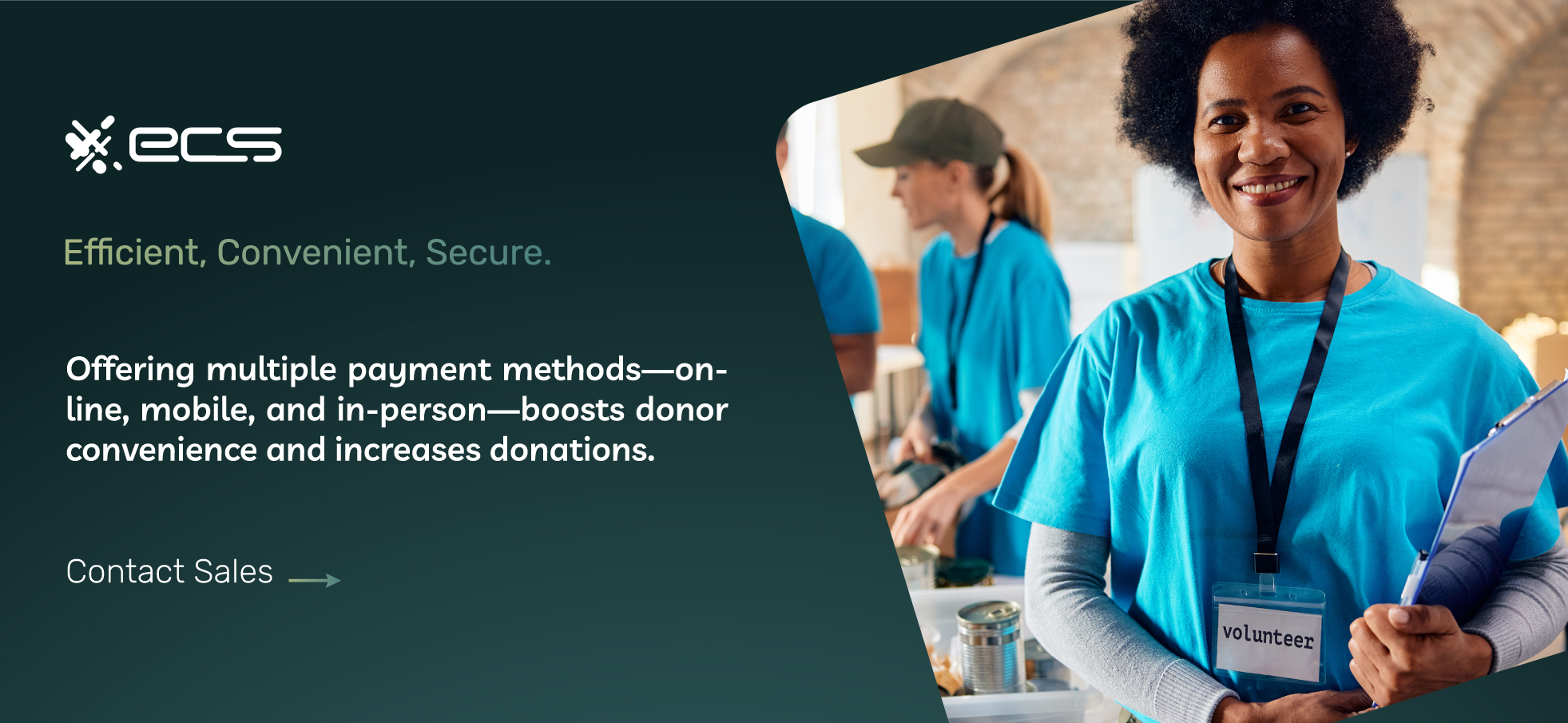
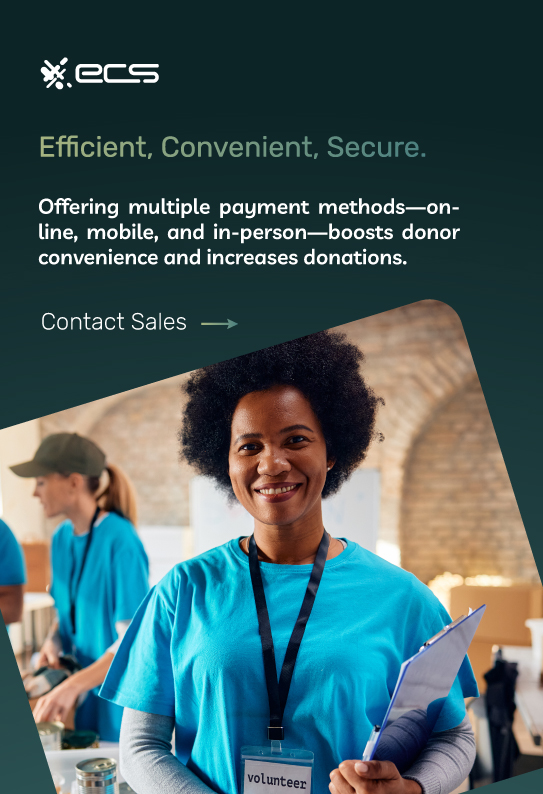
Online Donation Tools For Charities
Online donations through your website can make up the majority of your charity’s incoming revenue. Therefore, you want to optimize this fundraising tool so it’s as streamlined and efficient as possible.
One way to accomplish this is to create a donation page that you host yourself. For smaller charities, they may choose a hosted payment page. A hosted payment page is a payment or “checkout” page that a third party, generally your payment processor or payment gateway, hosts.
When a donor clicks to make a donation, they are taken to this third-party hosted payment page to enter their billing information. You can use these hosted pages for specific fundraising events or smaller charities. But you want to integrate your main checkout page with your existing website.
When you host your own payment page, online donating is streamlined and more integrated with your overall website. This leads to higher overall donations and also gives you more control over the total donation process, creating user-friendly donation processing for non-profits.
Choosing the right payment gateway allows you to have the best of both worlds. You can host your own payment page with full integration and control of what your donors experience on your website. You can also implement the gateway’s hosted payment page options for one-off fundraising efforts or campaigns using different websites, social media, or email and SMS campaigns.
When choosing a payment gateway and processor, ensure they will support website integration and hosted payment pages.
Payment Links
Payment links are another popular payment solution for non-profit fundraising strategies to raise funds from existing donors and contacts.
Payment links are links in an email message or SMS text that, when tapped or clicked, bring the user to a premade online donation form complete with the details needed to finish the donation. For returning donors, it can even have their credit card information stored on file.
As we explained in the previous section, you can set up payment links to direct the user to a page you host on your website or a hosted page. Hosted pages offer the benefit of being quicker to set up for specific purposes.
For example, if a news story about your charity or the kind of work you do gains popularity, you can quickly assemble a hosted page and send out payment links to your contact list.
Payment links are considered integrated payments, and they are possible when you have full control over your own merchant account.
Being able to capitalize on relevant news stories or trends with payment links and integrated payments can greatly increase your fundraising capabilities.
Mobile Payment Solutions For Charities
Mobile processing is becoming more common, and charitable organizations are using it to accept donations of any size at events or sell event tickets.
Mobile processing allows you to accept most types of digital payments through a special mobile payment processing terminal or a compatible mobile device.
No wired connection is needed, and these systems work via 4G or 5G cellular networks to complete the transaction. Your payment processor should offer you options to use dedicated mobile processing hardware or existing smartphones or tablets.
A non-profit payment processor can help you implement mobile payments and donations into your non-profit payment processing workflow.
Integrating Your Payment System With Your CRM or Donor List
One of the biggest advantages of having full control over your payment processing is the ability to integrate with your charity’s CRM, which you use to oversee your donor base. This significantly helps with streamlining donations in non-profit sectors and staying updated with payment technology trends for charities.
Several charity CRM platforms accept various payment gateway integrations that allow you to manage donations directly from the CRM. You can also use your CRM to automate donation requests such as payment links.
Overall, this helps enhance the donor experience with payment technologies and personalization efforts.
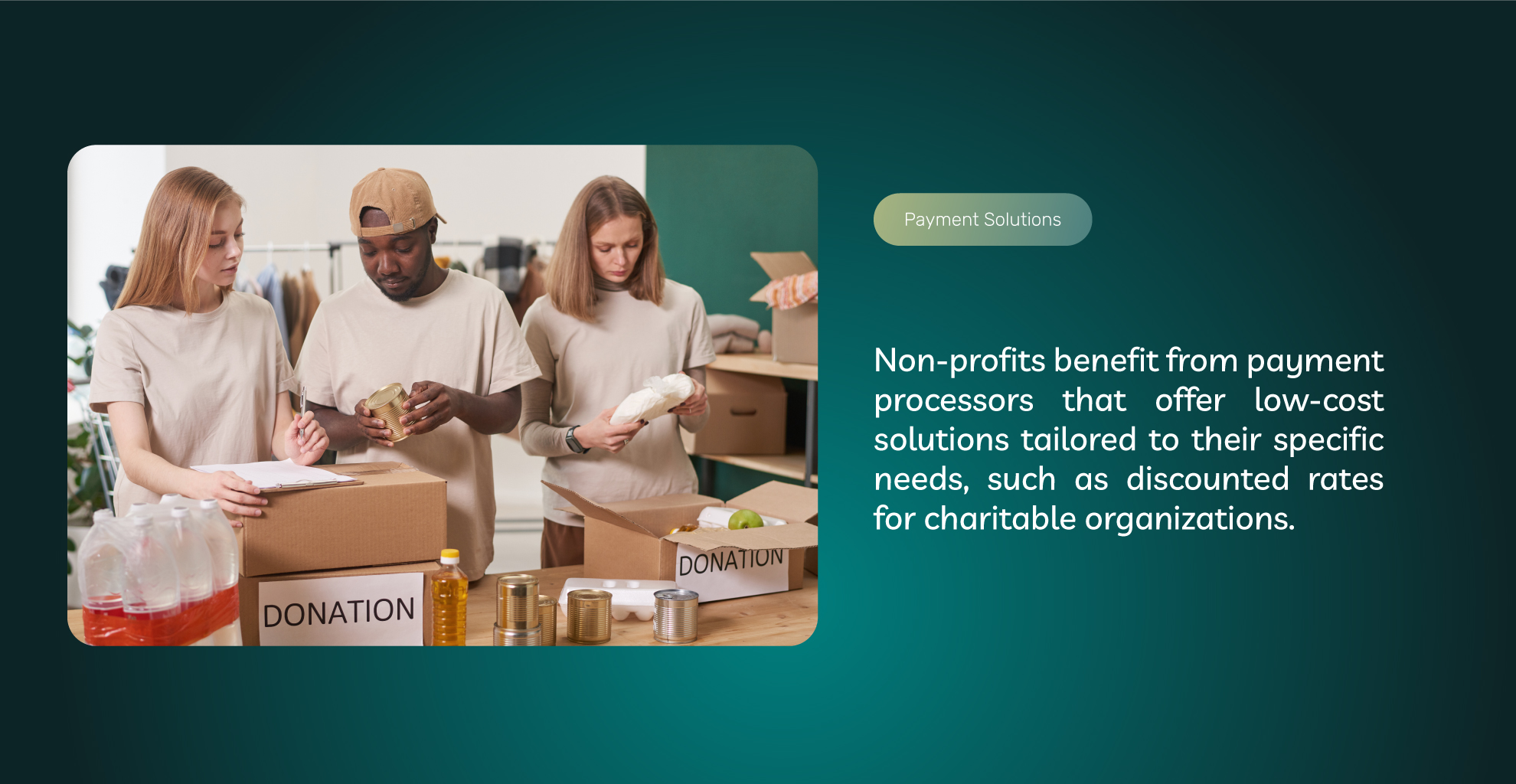
Choosing A Charity Payment Processor
Choosing the right payment processor is the most important aspect of setting up payment solutions for non-profit. Below, we’ll cover the key areas you should research so you can select the right processor for your needs.
Fee Structure
You will likely notice that different payment processors have different fee structures. The fee structures determine your overall processing costs and are generally broken down on a per-transaction basis.
Most aggregate providers and some dedicated merchant account providers offer a flat fee. Flat fee payment structures mean you pay the exact same rate for all your transactions regardless of factors like how the donation was made.
Flat fee structures can seem attractive because they are simple and easy to understand. However, unless you mostly take small donations, flat fee structures will end up costing you more money than other types of fee structures.
The other type of fee structure you’ll encounter most often as a charity is interchange plus pricing. With interchange plus pricing, your fee is based on the base interchange rate, which is what the card networks (Mastercard, Visa, etc.) charge. Then, your payment processor places a fee on top of that interchange rate to cover their service expenses.
Because interchange rates can vary, this flexible pricing model offers you the lowest processing fees. In most cases, charities will save considerable money by using Interchange Plus for their pricing.
However, make sure you discuss your average donation amount and processing volumes with your payment processor. There may be payment gateways with low fees for non-profits, that accommodate your specific volumes and other factors.
Your prospective payment processor can look over your anticipated processing data and determine the best pricing for your charity. However, if the payment processor only offers one type of processing fee structure, then they can’t offer the benefits that other fee structures can provide.
Maximum Payment Options
Donations can vary from carefully thought-out amounts to impulse donations after a recent event. This means you need the most digital payment options for non-profits to fit how your donors may send funds.
Credit and debit cards are likely your main source of contributions, but other options are growing in popularity. For example, digital wallets are one of the fastest-growing digital payment methods, including charitable donations. Ensure you can accept digital wallets online and via in-person or mobile processing.
Another example is ACH payments or eChecks. Many charities receive donations via check, but you can also accept these payments online to make donating easier and faster. You can also convert paper checks to eChecks to save money on processing fees.
Other options include peer-to-peer fundraising tools and integrations with existing donation platforms.
Overall, you need a payment processor that offers customizable payment solutions for non-profits. Many aggregate payment services only offer one type of payment hardware and limited options, which can reduce the revenue you can generate across different channels.
Customer Service
Customer service is critical, especially if your organization lacks in-house IT support or technical personnel. The right payment processor can help you integrate your payment gateway and other features so you can more easily reach your fundraising goals.
Your payment processor should have dedicated support in-house that you can contact by email or phone. Any downtime with your payment processing means you are not bringing in revenue. Exceptional customer service from your payment service helps you avoid lost revenue or issues with your payment processing.
Payment System Challenges For Non-Profits
Non-profits will use the same underlying payment technology to accept payments, but they face different challenges than for-profit businesses.
Non-Profit Payment System Security Concerns
Due to budgeting restraints, security is likely a bigger problem for non-profits than for-profit businesses.
Today, even for-profit companies struggle to keep up with cybersecurity costs. So imagine what it’s like for a non-profit that simply can’t afford the infrastructure or personnel for tight cybersecurity.
Because of this fact, hackers and cybercriminals will target non-profits since they view them as easy and vulnerable targets.
The solution to this is to work with your payment processor to discuss your options and find secure payments for non-profit organizations that fit your workflow and budget. Enhancing transparency in non-profit payments is crucial to building donor trust and ensuring compliance with regulatory standards.
For example, if you are unable to maintain the security of your website and checkout pages, you can use hosted payment pages instead. These are hosted on the payment gateway’s servers, so you never have to worry about security.
Another option is to store customer information for recurring donations on the payment gateway’s server. Once again, you don’t have to worry about security using this method.
The payment card industry also has a list of best practices and procedures known as PCI DSS. Depending on your processing volumes, you may have different requirements to be PCI compliant.
Your payment processor can help you with security compliance in non-profit payment processing so you can process your donation without risking possible data breaches or hacks.

High Fees
It’s not uncommon for charities to pay higher processing fees. When setting up their payment processing, charities will sometimes choose the first option that seems the easiest to implement.
This is often due to budget constraints or a lack of technical personnel on their team. The problem is that the easiest payment processing options tend to have the highest transaction fees.
While a small percentage increase in processing fees may seem like no big deal, it really does add up to a lot of money over the charity’s lifetime. This is especially true if you deal with larger donations. Some fee structures penalize larger transactions, which means you’ll lose much more in these cases.
When choosing payment solutions for non-profit donations, make sure to shop around and find the free structure and pricing model that will save you the most money. Your payment processor should be able to look at your estimated transaction volumes and recommend a fee structure that works best for your charity. There are low-cost payment solutions for charities, and finding them can help reduce costs significantly.
This helps you use more of your donor’s funds to do the important work your charity provides to the community.
Integrating Payment Systems In Non-Profit Operations
Integration is another challenge faced by many charities, and it’s once again due to budget constraints or a lack of dedicated technical personnel. However, non-profit financial transaction management is crucial for creating efficient and streamlined processes that can enhance overall operational effectiveness.
Finding cost-effective payment solutions for non-profit organizations can alleviate some of these challenges. A lack of integration between your existing systems and your payment processing creates unnecessary bottlenecks and inefficiency that cost you money.
Beyond that, you miss out on critical fundraising capabilities such as automated campaigns, payment links, and other tools that are only possible via integrated payments.
Even if you don’t have the technical staff to manage these integrations, the right payment processor can help you make seamless integrations possible. A dedicated merchant account provider can give you options to find the right payment gateway to integrate with whatever systems you’re currently using.
They can also help you explore options for achieving maximum integration with the least amount of technical complexity.
Learn More About Opportunities In Non-Profit Payment Innovations
At ECS Payments, we offer charities the most options possible so they can leverage the latest digital payment solutions to increase their donations.
We also help charities with the technical aspects of payment processing, so regardless of your organization’s size or complexity, we can offer the perfect solution that reduces your overhead and maximizes your fundraising potential.
Contact ECS Payments to chat with one of our charity payment processing experts.
Frequently Asked Questions About Payment Solutions for Non-Profits
The benefits of efficient payment processing for charities include increased:
•Transparency
•Donor satisfaction
•Retention
•Fundraising potential.
And reduced administrative costs and risk of fraud.
A merchant account gives charities access to a payment gateway for sending and receiving transactions for digital payments such as credit and debit cards and ACH or eChecks.
Aggregate payment processors are companies that bundle all customer processing under a single merchant account. While they can be convenient, charities should be cautious about using them because they often charge higher fees, offer less control over the donation process, and are known for poor customer service.
Charities can accept payments through online donation tools, payment links, mobile payment solutions, and in-person donations. Each channel has advantages and disadvantages, so charities should choose the channels that best suit their individual needs.
Integrating a charity’s payment system with its CRM or donor list can help streamline donations, enhance the donor experience, automate donation requests, and personalize the donation process.
